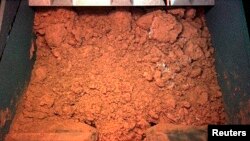MOSCOW —
Europe and Russia signed a deal on Thursday for a joint Mars mission to sample dirt from the Red Planet that they hope will answer the mystery of whether there is life beyond Earth.
Europe had hoped to work with NASA on the two-spacecraft mission but turned to the Russians after the U.S. agency pulled out due to budget shortfalls and a change in direction.
The announcement comes amid heightened excitement over the search for life on the planet most like Earth after scientists said analysis from NASA's own mission rover, Curiosity, showed Mars had the right ingredients for life.
NASA wants to follow up with a duplicate rover in 2020 and bring samples home for study, but the Russian and European team hope to launch its probes in 2016 and 2018 — setting up the makings of a new post-Cold War space race for one of science's biggest prizes.
"Establishing whether life ever existed on Mars is one of the outstanding scientific questions of our time and the highest scientific priority of the ExoMars program," the European Space Agency (ESA) said in a statement.
Moscow will provide the rockets to launch the Exobiology on Mars, or ExoMars, mission. Russian Space Agency Roskosmos will also design the descent module and surface platform for the second leg of the venture.
Despite describing the ExoMars project as the "Holy Grail of Mars exploration," NASA left the $1.3 billion project in February 2012, citing a budget crunch and a change in focus.
Europe then turned to Russia for the launch vehicle. The two space agencies agreed to cooperate together last April, but talks to work out the details dragged out for nearly a year.
"This event was a long time in the making and took a great deal collaboration," Roskosmos head Vladimir Popovkin said after signing the deal with ESA Director Jean-Jacques Dordain in Paris.
Russia's involvement in the ambitious mission could boost the status of its once-pioneering space agency after a litany of costly and embarrassing failures.
The delays in agreeing on mission details hinged on the extent of Russia's participation, according to Russian space experts who said Moscow had seemed to have achieved its goal of full partnership.
"The agreement implies that Russian scientists and engineers will become full-fledged participants in all the international scientific and technical groups established by the parties to the project," Roskosmos said in a statement.
What was to be Russia's first deep space mission in more than two decades — the Phobos-Grunt mission to scoop up soil samples from Mars — was among five botched launches that hurt Moscow's reputation as a reliable launch partner.
European governments have so far committed 850 million euros for the mission.
The cap for the project had been set at 1 billion euros [$1.3 billion], but delays and changes to the scientific aspects of the mission are expected to drive up the price tag.
Although NASA pulled out, the U.S. space agency will still contribute radio equipment and telecom support.
Europe had hoped to work with NASA on the two-spacecraft mission but turned to the Russians after the U.S. agency pulled out due to budget shortfalls and a change in direction.
The announcement comes amid heightened excitement over the search for life on the planet most like Earth after scientists said analysis from NASA's own mission rover, Curiosity, showed Mars had the right ingredients for life.
NASA wants to follow up with a duplicate rover in 2020 and bring samples home for study, but the Russian and European team hope to launch its probes in 2016 and 2018 — setting up the makings of a new post-Cold War space race for one of science's biggest prizes.
"Establishing whether life ever existed on Mars is one of the outstanding scientific questions of our time and the highest scientific priority of the ExoMars program," the European Space Agency (ESA) said in a statement.
Moscow will provide the rockets to launch the Exobiology on Mars, or ExoMars, mission. Russian Space Agency Roskosmos will also design the descent module and surface platform for the second leg of the venture.
Despite describing the ExoMars project as the "Holy Grail of Mars exploration," NASA left the $1.3 billion project in February 2012, citing a budget crunch and a change in focus.
Europe then turned to Russia for the launch vehicle. The two space agencies agreed to cooperate together last April, but talks to work out the details dragged out for nearly a year.
"This event was a long time in the making and took a great deal collaboration," Roskosmos head Vladimir Popovkin said after signing the deal with ESA Director Jean-Jacques Dordain in Paris.
Russia's involvement in the ambitious mission could boost the status of its once-pioneering space agency after a litany of costly and embarrassing failures.
The delays in agreeing on mission details hinged on the extent of Russia's participation, according to Russian space experts who said Moscow had seemed to have achieved its goal of full partnership.
"The agreement implies that Russian scientists and engineers will become full-fledged participants in all the international scientific and technical groups established by the parties to the project," Roskosmos said in a statement.
What was to be Russia's first deep space mission in more than two decades — the Phobos-Grunt mission to scoop up soil samples from Mars — was among five botched launches that hurt Moscow's reputation as a reliable launch partner.
European governments have so far committed 850 million euros for the mission.
The cap for the project had been set at 1 billion euros [$1.3 billion], but delays and changes to the scientific aspects of the mission are expected to drive up the price tag.
Although NASA pulled out, the U.S. space agency will still contribute radio equipment and telecom support.












